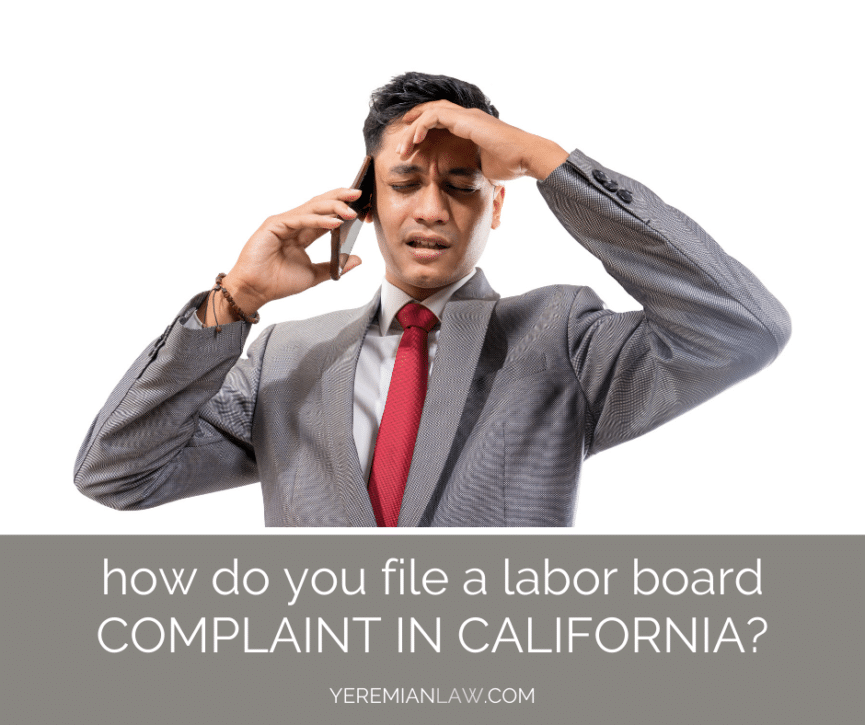How do you file a labor board complaint in California? The answer to this question depends on the specific situation and whether or not you are a member of a labor union. If you are not a member of a labor union, you will need to file your complaint with the Labor Commissioner’s Office or the Department of Fair Employment and Housing, or DFEH.
Filing a Complaint With the California Labor Commissioner’s Office
The Labor Commissioner’s office handles disputes such as wage claims, unpaid overtime, minimum wage violations, vacation pay, sick leave, meal and rest periods, commission agreements, worker classification, and freedom from workplace harassment. If you believe your employer has violated any of these labor laws, you can file a claim with the Labor Commissioner’s Office.
If you are not a member of a labor union, you can file a complaint with the Labor Commissioner’s Office. You can do this by visiting their website or calling their office.
The website for the California Labor Commissioner’s Office is here.
Related: Do you still have workplace rights if you’re an undocumented immigrant in California?
Filing a Workplace Complaint With the California Department of Fair Employment and Housing
The Department of Fair Employment and Housing, or DFEH, is responsible for enforcing California’s anti-discrimination, anti-harassment, and hate crime laws. If you believe that you have been the victim of workplace discrimination or harassment, you can file a complaint with the DFEH.
You can file a complaint with the DFEH by visiting their website or calling their office. The website for the California Department of Fair Employment and Housing is here.
Note: If you are a member of a labor union, you should file your complaint with them. The labor union will then file the complaint with the appropriate agency.
What Happens After I File a Complaint?
After you file a complaint with the Labor Commissioner’s Office, the Department of Fair Employment and Housing, or your union representative, they will investigate the matter and determine whether or not there has been a violation of California’s labor laws. If they find that a violation has occurred, they will take appropriate action to remedy the situation. This may involve ordering the employer to pay back wages, provide benefits, or take other corrective action.
Can You File an Employment Lawsuit After Filing a Labor Complaint With DFEH or the Labor Commissioner’s Office?
It is possible to file an employment lawsuit after filing a complaint with the Department of Fair Employment and Housing or the Labor Commissioner’s Office. You should speak to an attorney about your options.
Your attorney will need to know the details of your case in order to give you specific legal advice.
You may be able to file a lawsuit if you have experienced:
- Unfair pay practices, including being paid less than minimum wage or not being paid for all the hours you worked
- Being denied meal or rest breaks
- Working in hazardous conditions without proper safety gear or training
- Being harassed or discriminated against at work
If you have experienced any of these things (or something similar), you may have a valid claim. An attorney will be able to review your case and let you know what legal options are available to you.
A Word on Filing a Complaint With a Labor Union
If you are a member of a labor union, you will need to file your complaint with your union representative. The union representative will then investigate the matter and determine whether or not there has been a violation of California’s labor laws. If they find that a violation has occurred, they will take appropriate action to remedy the situation.
Do You Need to Talk to an Attorney About Filing a Labor Board Complaint?
If you feel you’ve been discriminated against at work or have been subject to unfair pay practices, denial of breaks, or working in hazardous conditions, we may be able to help you. Call our office at 818-230-8380 or fill out the form below to schedule a free consultation with a Los Angeles employment attorney who will review your case and tell you about your options for resolving the situation.




